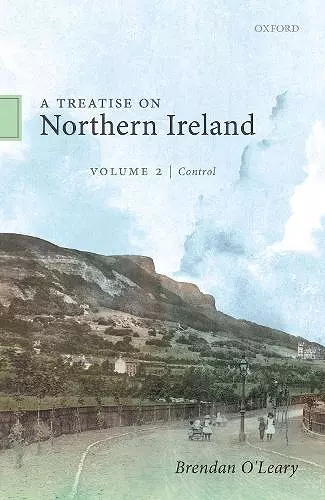A Treatise on Northern Ireland, Volume II
Control
Format:Hardback
Publisher:Oxford University Press
Published:17th Apr '19
Currently unavailable, and unfortunately no date known when it will be back
This hardback is available in another edition too:
- Paperback£39.99(9780198870722)

This landmark synthesis of political science and historical institutionalism is a detailed study of antagonistic ethnic majoritarianism. Northern Ireland was coercively created through a contested partition in 1920. Subsequently Great Britain compelled Sinn Féin's leaders to rescind the declaration of an Irish Republic, remain within the British Empire, and grant the Belfast Parliament the right to secede. If it did so, a commission would consider modifying the new border. The outcome, however, was the formation of two insecure regimes, North and South, both of which experienced civil war, while the boundary commission was subverted. In the North a control system organized the new majority behind a dominant party that won all elections to the Belfast parliament until its abolition in 1972. The Ulster Unionist Party successfully disorganized Northern nationalists and Catholics. Bolstered by the 'Specials,' a militia created from the Ulster Volunteer Force, this system displayed a pathological version of the Westminster model of democracy, which may reproduce one-party dominance, and enforce national, ethnic, religious, and cultural discrimination. How the Unionist elite improvised this control regime, and why it collapsed under the impact of a civil rights movement in the 1960s, take center-stage in this second volume of A Treatise on Northern Ireland. The North's trajectory is paired and compared with the Irish Free State's incremental decolonization and restoration of a Republic. Irish state-building, however, took place at the expense of the limited prospect of persuading Ulster Protestants that Irish reunification was in their interests, or consistent with their identities. Northern Ireland was placed under British direct rule in 1972 while counter-insurgency practices applied elsewhere in its diminishing empire were deployed from 1969 with disastrous consequences. On January 1 1973, however, the UK and Ireland joined the then European Economic Community. Many hoped that would help end conflict in and over Northern Ireland. Such hopes were premature. Northern Ireland appeared locked in a stalemate of political violence punctuated by failed political initiatives.
He colors his work throughout with lively writing, moving past equivocation and pulling no punches in his assessments of participants or previous scholarship ... the author has thoughtfully structured his books and chapters in a way that is accessible to both non-experts and specialists. Whatever the audience, this is a work of canonical importance for understanding Northern Ireland ... Highly recommended. * M. J. O'Brien, CHOICE *
The detailed coverage is astonishing, the range immense. The book exemplifies best practice in social science and history, combining both disciplines, asking analytic questions of the historical record and widening the remit of social science - above all by looking carefully both at political calculations and the details of constitutional arrangements. It is important to stress that he offers us an analytic history of Ireland as a whole, paying special attention to developments in the Irish Free State and to the Republic thereafter. * John A Hall, McGill University in Montreal, Dublin Review of Books *
The most prolific, perceptive and powerfully analytical writer on the north in the last 35 years, Brendan O'Leary, has just produced his magnum opus. * Brian Feeney, Irish News *
- Winner of Winner of the James S. Donnelly, Sr. Prize from the American Conference for Irish Studies An Irish Times Book of the Year 2019.
ISBN: 9780198830573
Dimensions: 241mm x 161mm x 20mm
Weight: 572g
304 pages